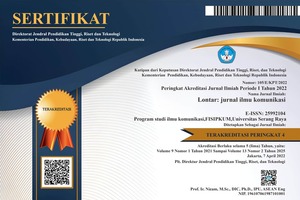Mempertanyakan Kembali Bhinneka Tunggal Ika Di Era Post Truth Melalui Media Sosial
DOI:
https://doi.org/10.30656/lontar.v6i2.953Abstract
The phenomenon of post-truth appears, in which a view believed to be true is inverted and made contradictory as a new form of truth. This phenomenon appears to occur in several countries such as the United States, North Korea, the Philippines and also Indonesia. This can be seen from various actions carried out by radical organizations that question the values of Bhinneka Tunggal Ika with the desire to change these values by referring to religious values. This activity is increasingly growing in terms of followers, and further builds up on the blasphemy case accusations towards former Jakarta Governor, Basuki Tjahaja Purnama.This research focuses on how the social media has an influence in expanding the spread of hoaxes and hate speech as an effort to destabilize the values of Bhinneka Tunggal Ika. Information and data were obtained from interviews with mass organizations often labeled radical, non-governmental organizations and social observers.
The results of this study confirm the need for capacity building both in the form of media literacy and also the socialization of Bhinneka Tunggal Ika values through social institutions and the Government. This is intended to create strong social capital, especially in fostering a sense of trust in the context of a pluralist society in Indonesia.
Keywords: Post truth, Bhinneka Tunggal Ika, Social Media, Social Capital, Trust.
Downloads
Published
Issue
Section
License
By submitting an article to the journal, the author(s) agree to transfer the published article's copyright to the journal, which will act as the publisher. This means the journal will have the right to publish the article in various forms, including reprints. The journal will maintain the publishing rights to the published articles.
In line with the license, authors and third parties (readers, researchers, and others) are allowed to share and adapt the material. In addition, the material must be given appropriate credit, provided with a link to the license, and indicated if changes were made. If authors remix, transform, or build upon the material, authors must distribute their contributions under the same license as the original.






